Dynamics of Sailing Camps in the Caribbean


Intro
Sailing camps in the Caribbean, a picturesque oasis of blue waters and sunny skies, offer a unique blend of education and adventure. Participants from all walks of life find themselves caught up in the allure of these camps, where learning to sail becomes as much about personal growth as mastering the craft itself. This article takes a deep dive into the diverse dynamics at play in these camps, shedding light on the educational programs offered, the demographics they attract, and the environmental factors that shape each experience.
Through this exploration, we not only highlight the skill levels of participants but also consider the broader cultural and social aspects entwined with sailing in this vibrant region. From budding enthusiasts looking to catch their first wind to seasoned sailors refining their proficiency, there’s a niche for everyone. This dialogue leads to an emphasis on community bonds, sustainable practices, and economic implications. Get ready to unravel the layers of sailing camps in the Caribbean, where the sea acts as both classroom and playground.
Preface to Caribbean Sailing Camps
Sailing camps in the Caribbean offer an intriguing blend of skills development, cultural immersion, and the sheer enjoyment of the ocean. This section highlights the significance of such camps, emphasizing not only the instructional benefits but also the enriching experiences they provide for participants. Whether for leisure or competition, sailing camps unlock the various dimensions of maritime life, appealing to a broad audience including enthusiasts, families, and aspiring professionals.
The multifaceted nature of these camps includes:
- Skill Development: From basic sailing techniques to advanced maneuvering, participants can deepen their understanding and proficiency.
- Cultural Exchange: Participants often have the chance to interact with local sailors and immerse themselves in regional traditions, enhancing their overall experience.
- Community Building: Sailing camps often foster connections among participants, creating networks of like-minded individuals passionate about the sea.
Engaging with these camps can yield numerous advantages. They provide structured environments where learners can safely explore the nuances of sailing while also enjoying the stunning Caribbean backdrop. These settings encourage self-discovery and personal growth, as participants often face the challenges presented by varying weather conditions and sailing demands.
Thus, sailing camps stand as vital opportunities for not only refining sailing skills but also for cultivating a sense of adventure and belonging. The Caribbean is a paradise that offers unique educational frameworks within an idyllic coastal environment. This section serves as a foundation for understanding the dynamic interactions that occur within these camps, setting the stage for further exploration into their types and impact.
Defining the Concept of Sailing Camps
Sailing camps in the Caribbean are designed uniquely to cater to various audiences with their diverse offerings. By definition, these camps may range from intensive instructional programs directed at aspiring sailors to casual explorations focused on family bonding and leisure. They often blend practical sailing lessons with educational components, such as navigation and marine ecology.
The concept extends beyond simply hoisting sails; it encompasses:
- Education: Camps focus on imparting both theoretical knowledge regarding sailing and practical skills through hands-on training.
- Certification: Many programs are recognized by specific sailing associations, enabling participants to gain credentials that validate their skills.
- Recreational Enjoyment: Beyond the instructional aspect, leisure sailing is a core component; many camp-goers simply seek an enjoyable time on the water.
Ultimately, the concept of sailing camps centralizes around the idea of learning through experience in a communal environment. Every camp brings its own flavor, influenced by local culture and geography, but the common thread remains: fostering a love for the water and the inexorable pull of the Caribbean sea.
Historical Context of Sailing in the Caribbean
To fully appreciate sailing camps today, it's essential to understand the historical context that has shaped sailing in the Caribbean. The Caribbean region has a rich history steeped in maritime activities that traces back centuries, influenced by indigenous cultures, European colonization, and the thriving trade routes established during the Age of Sail.
Sailing was not merely a means of transportation. For early Caribbean inhabitants, it formed crucial parts of their daily lives, facilitating trade and cultural exchanges among islands. As European explorers, traders, and eventually pirates roamed these waters, they too adapted to and adopted the art of sailing, laying the groundwork for the diverse sailing traditions seen today.
Major influences include:
- Indigenous Practices: Local tribes used canoes for fishing and trade, setting the stage for sailing's significance within the community.
- Colonial Impact: European powers recognized the strategic importance of these islands, enhancing shipbuilding techniques and navigation skills.
- Economic Transformation: The demand for trade expanded sailing's reach, making it integral to regional economies and shaping maritime laws still relevant today.
With such a layered history, sailing has evolved into a beloved recreational pursuit in the Caribbean, informing the structure and ethos of contemporary sailing camps. Participants can engage with this rich legacy while honing their skills, thereby ensuring the continued relevance and enjoyment of sailing in the region's cultural identity.
Types of Sailing Camps Available
Understanding the different types of sailing camps in the Caribbean is crucial for anyone eager to dive into this world. Each camp offers unique experiences and is tailored to specific audiences. Knowing the distinctions can help participants choose a camp that aligns with their interests and skill levels. From competitive racing to leisure family outings, sailing camps cater to a wide range of needs.
Performance Sailing Camps
Performance sailing camps are designed for individuals looking to enhance their skills and participate in competitive sailing. These camps often attract serious sailors and those aiming to race at a higher level. Instructors commonly focus on advanced tactics, boat handling, and weather navigation, ensuring participants leave prepared for real-world racing scenarios.
A notable takeaway from these camps is the emphasis on teamwork and strategy. Participants learn to communicate effectively on the water, which is vital in competitive sailing. Skills gained here can elevate a sailor's performance significantly.
- Key Benefits of Performance Camps:
- Enhanced sailing techniques to increase competitiveness
- Opportunities to participate in local and international regattas
- Networking with other serious sailors and professionals in the industry
Family-Oriented Sailing Experiences
Family-oriented sailing experiences cater to all ages, making them ideal for those wishing to bond over shared adventures. These camps strike a balance between learning and leisure, ensuring that family members with different skill levels can enjoy the journey together.
Families can participate in fun activities applying the fundamentals of sailing while gaining hands-on experience. This approach often includes lessons on safety and seamanship, making sailing approachable for beginners.
- What Families Gain from These Camps:
- Quality time spent together, enjoying the sun and sea
- Learning basic sailing skills in a supportive environment
- Creating lasting memories that can be cherished for years
Youth Sailing Programs
Youth sailing programs are tailored specifically for young sailors, often ranging from ages 8 to 17. These programs not only teach sailing skills but also promote values such as responsibility, teamwork, and respect for nature. They are particularly popular due to their engaging environments and fun, interactive lessons.
Typically held during school breaks or summer months, these camps can serve as stepping stones for aspiring young sailors. Alongside essential sailing lessons, participants may engage in junior races or instructional clinics, where they sharpen their skills in a friendly competitive atmosphere.
- Notable Advantages for Youth Participants:
- Development of lifelong skills: confidence, independence, and problem-solving
- Opportunity to meet fellow young sailing enthusiasts
- A foundation that could lead to further sailing education or even a future career in the maritime field
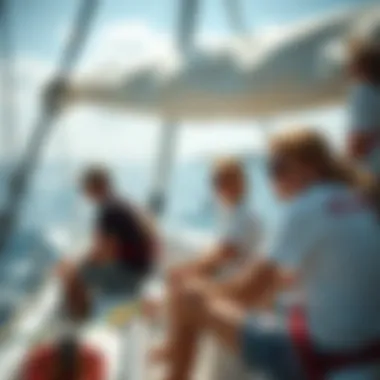

Overall, the types of sailing camps available in the Caribbean present unique opportunities for diverse audiences. Each camp caters to different interests, skill levels, and objectives, making it essential for potential participants to assess their needs before committing.
Location and Environmental Considerations
The Caribbean is a treasure trove of sailing possibilities, and understanding the location and environmental considerations can make all the difference in shaping a fulfilling experience at sailing camps. A well-chosen site not only offers stunning backdrops but also directly influences the safety, skill development, and overall enjoyment for participants. Thus, diving into the specific characteristics of these locations sets the stage for successful sailing adventures.
Geographical Diversity of the Caribbean
The Caribbean is not a monolithic entity. It comprises over 700 islands, cays, and reefs, each with its own unique geographical features. From the lush, hilly landscapes of St. Lucia to the arid, wind-swept shores of Bonaire, these distinct characteristics create an array of sailing conditions that can cater to different levels of expertise and preferences.
- Island-Hopping Adventures: Participants can explore multiple islands, each presenting its own sailing challenges and attractions. This geographical diversity encourages learning through exposure to various marine environments.
- Protected Waters vs. Open Seas: Some areas, like the Virgin Islands, offer sheltered bays that are ideal for beginners, while others, such as the open waters off Jamaica, are suitable for more advanced techniques and experiences.
This contrast means that sailing camps can tailor their programs based on the surrounding natural attributes, fostering both skill enhancement and deepening appreciation for local ecosystems.
Climate Influence on Sailing Conditions
The climate of the Caribbean plays a pivotal role in determining when and how sailing camps operate. Typically, the region enjoys a tropical climate, abundant sunshine, and consistent trade winds. However, variations occur between islands, impacting the sailing experience in significant ways.
- Seasonal Winds: The winter months (November to April) usually bring favorable winds. This season is characterized by steadier breezes, making it ideal for a range of sailing activities. Conversely, summer often sees variability in winds, which can challenge even seasoned sailors.
- Hurricane Season: Another consideration is the hurricane season, which runs from June to November. Camps on islands like Puerto Rico must be especially cautious during this time, with some adjusting their schedules or activities to mitigate risks.
In essence, optimal sailing conditions can vary widely, and understanding these factors helps students and instructors alike plan accordingly.
As sailing enthusiasts, explorers in the Caribbean can revel in the diverse gifts of nature—reshaping their skills while cultivating an enduring bond with the sea.
"Though you can sail afternoon breezes, it’s the unique opportunities presented by the local geography and climate that make every camp a freshly penned chapter of adventure."
To gain deeper insights into specific regions, consider exploring resources like Britannica or the Wikipedia page on the Caribbean.
Skill Levels and Target Audience
Understanding the diverse skill levels and varying target audiences is fundamental to the Caribbean sailing camp experience. This awareness ensures that all participants, regardless of their background or expertise, find value in their time spent on the water. The clear delineation between beginner-friendly approaches and more advanced techniques allows camps to tailor their programs effectively. Catering to the distinctive needs of different sailing enthusiasts fosters a supportive environment, enhancing personal growth and skill development.
For instructors and camp organizers, being mindful of participant levels means designing curricula that nurture progression. A well-rounded program not only helps beginners grasp the basics, but it also paves the way for advanced sailors to refine their techniques and compete. Thus, recognizing the skill spectrum is not just beneficial—it's essential.
Beginner-Friendly Approaches
The entry point for many into the sailing world is often filled with excitement mixed with a touch of apprehension. This is where beginner-friendly approaches shine. Camps focused on novices prioritize creating a welcoming environment. They often employ simple, straightforward language and provide hands-on experiences, which resonate with newcomers.
Instructors typically break down complex sailing concepts into bite-sized pieces. Using practice boats that are stable, like the Sunfish or Optimist, allows beginners to build confidence without feeling overwhelmed. Emphasis on safety practices further ensures that participants feel secure as they learn. In addition, incorporating fun elements like group activities can demystify the sailing experience, transforming it from an intimidating challenge to an enjoyable adventure.
Key aspects of beginner-friendly programs include:
- Introductory Workshops: Offering foundational knowledge about sailing dynamics and terminology.
- Small Group Instruction: Promoting personalized attention and a supportive learning atmosphere.
- Hands-On Learning: Allowing participants to get directly involved in sailing tasks, reinforcing physical skills alongside theoretical knowledge.
Advanced Techniques and Competitions
For the more seasoned sailors, advanced techniques are the name of the game. These camps offer a different flavor, often centered around honing competitive skills and refining sailing prowess. Training focused on racing tactics, wind analysis, and advanced maneuvers prepares participants not just to enjoy sailing, but potentially to enter competitions.
Dedicated sessions in these camps might include:
- Tactical Simulations: Real-time decision-making drills that mimic race conditions.
- Performance Optimization: An in-depth focus on boat handling, rigging adjustments, and sail trim.
- Peer Coaching: Encouraging experienced sailors to share their insights and techniques enhances mutual learning.
Camps that cater to this segment often have competitive events, providing aspiring racers a platform to showcase their skills. The ethos here is about pushing boundaries and aiming for personal bests, making it a thrilling experience for participants who thrive under pressure.
Catering to Diverse Backgrounds
Caribbean sailing camps draw participants from various walks of life. This diversity enriches the experience for everyone involved. Recognizing that not everyone shares the same background, instructors adapt their methodologies to ensure inclusivity.
Programs often observe cultural and socioeconomic variances that can affect how sailing is taught and learned. For instance, camps might integrate local sailing traditions or languages to make content more relatable. Additionally, financial assistance or scholarships help bridge gaps, ensuring those who are passionate but might be limited by resources still have opportunities to learn.
How to cater to these diverse backgrounds:
- Inclusive Curriculum Design: Adapt lesson plans to include stories and practices from different cultures.
- Community Integration: Create programs that tie back to local communities, fostering respect and appreciation for indigenous sailing knowledge.
- Flexible Scheduling: Offer various program lengths and payment options to accommodate different life situations.
Ultimately, understanding and integrating the unique profiles of participants yields a more enriching sailing camp experience, fostering community and connection on the beautiful Caribbean waters.
"The sea is a place of freedom. Those who sail it should come from all walks of life, sharing their own stories and learning from one another."
By shaping sailing camps around skill levels and diverse backgrounds, organizations not only enhance the education being offered but also create a vibrant community of enthusiasts passionate about the adventure of sailing.
Instructional Methodologies
The approach to teaching sailing skills in the Caribbean greatly influences learners' experiences and outcomes. Understanding instructional methodologies can help in grasping how participants, whether they are beginners or seasoned sailors, can effectively master sailing techniques while enjoying the beauty of the Caribbean waters. The blend of theory, practice, and local context enriches the overall educational experience in sailing camps.
Pairing Theory with Practice
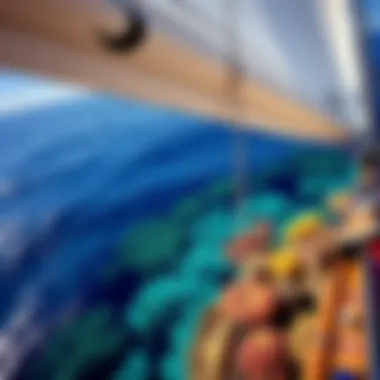
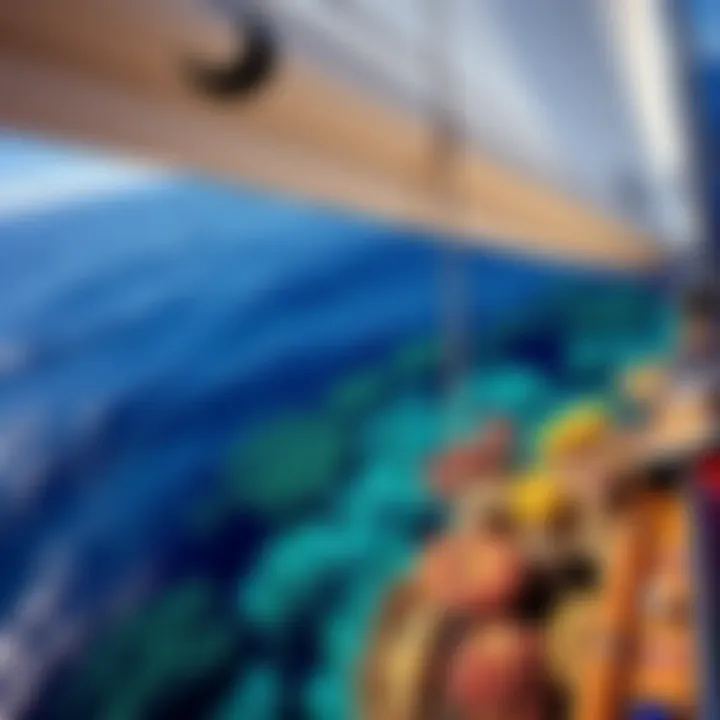
In any learning environment, especially one as dynamic as sailing, theory and practice must go hand-in-hand. Participants might spend time learning about sail types, wind patterns, and navigation techniques in a classroom setting, but the real magic occurs when they put that knowledge to test out on the water. For example, a sailor might learn about the physics of tacking—a maneuver used to change the direction of the boat by sailing against the wind—but understanding the concept is just the first step.
When they are actually on a sailboat, feeling the wind on their face and experimenting with the helm, the theoretical knowledge transforms into practical skills. This transition solidifies learning in a way that classroom discussions simply cannot achieve. While enjoying the turquoise waters of the Saint Martin lagoon, one might gain a real-time appreciation for the speed and agility of their vessel, leading to a deeper understanding of what they need to master.
To facilitate this pairing of theory and practice, many camps utilize structured lesson plans, which may include:
- Interactive Discussions: Engaging sailors in conversations about their experiences on the water, linking theory to real-world scenarios.
- Simulations: Utilizing sail simulators to replicate sailing conditions, assisting learners in developing their skills in a controlled environment.
- Progressive Challenges: Gradually increasing the complexity of tasks, allowing participants to build confidence and competence at their own pace.
Ultimately, this synergy between theory and practice enhances both skill acquisition and retention. Without it, participants may struggle to apply their knowledge effectively.
Utilizing Experienced Instructors
Having seasoned instructors is equivalent to having a treasure chest of knowledge at disposal. In sailing camps across the Caribbean, instructors often bring not only vast sailing experience but also an understanding of the local waters and weather patterns. It’s not just about knowing how to sail; it’s about knowing how to teach and share passion effectively. The beauty of practical sailing experience combined with narrative real-world experiences makes lessons rich and relatable.
For instance, an instructor versed in both competitive and recreational sailing can tailor teaching methods to fit varied student backgrounds.
Some significant advantages of learning from experienced instructors include:
- Personalized Feedback: They can provide insightful critiques, helping participants identify their strengths and weaknesses effectively.
- Safety Awareness: Having experienced sailors helps ensure a focus on safety protocols, teaching students how to mitigate risks associated with sailing.
- Cultural Context: Instructors often incorporate local culture and history into their teaching, offering context that makes learning richer and more enjoyable.
Additionally, their enthusiasm can foster an inspiring learning environment. The stories they tell while pointing out the beauty of the surrounding islands make participants eager to learn and explore more. This kind of mentorship creates a community where learning is both enjoyable and profound, cultivating not only sailors but also sailing enthusiasts.
"The wind and the waves are always on the side of the ablest navigator." – Edward Gibbon
By focusing on these instructional methodologies, sailing camps in the Caribbean can create a nurturing and educational atmosphere that both enriches skills and fosters a lasting love for sailing.
Cultural Influence on Sailing Experiences
Understanding the cultural influence on sailing experiences in the Caribbean is imperative. It adds depth to the practice and enriches the learning journey. Each island has its own unique history, customs, and maritime traditions that shape how sailing camps are structured, thus offering participants more than just navigation skills; they get a taste of the local culture.
Integration of Local Traditions
One cannot overlook how local traditions intertwine with sailing in the Caribbean. Local folklore, music, and cuisine manifest in nearly every sailing camp, encouraging a more immersive experience. Picture a sunset sail accompanied by local musicians strumming traditional rhythms, or evenings spent learning recipes that have been passed down through generations. These elements make sailing more than a sport; they become a cultural pilgrimage.
Each camp seeks to educate participants about the significance of local practices. Learning how indigenous communities have sailed these waters long before modern technology arrived enhances the understanding of maritime navigational techniques. For example, on islands like Dominica, students may find themselves exploring the significance of the Kalinago heritage, learning about their sailing traditions while on the sea.
Social Interactions Within Camps
The social dynamics at sailing camps also highlight the cultural influences at play. Interaction among participants often leads to interpersonal learning experiences that transcend geographical backgrounds. The camaraderie built during group sailing lessons fosters a sense of belonging, where participants share stories and bond over their mutual love for sailing.
Furthermore, these interactions can bridge cultural divides. Imagine an evening circle where sailors from diverse backgrounds share sailing experiences, dancing to the rhythm of the drums played by local instructors. These moments allow for a cross-cultural exchange of ideas and sailing techniques, creating a rich tapestry of friendships and collaborations.
Instructors also play a significant role in facilitating these connections. Their local knowledge allows them to weave stories into lessons, making the sail about more than just the how-to but also the why. This makes the experience deeply enriching, transforming a simple sailing camp into a melting pot of cultures, ideas, and shared dreams.
As sailing enthusiasts, understanding the cultural nuances can be a great asset, enhancing both the enjoyment and the educational value of these experiences.
"Sailing is not just about mastering the wind but also about understanding the winds of change carried by diverse cultures."
Further reading can be done through resources like Wikipedia or Britannica for general knowledge about sailing and its cultural impacts.
In summary, the cultural influences abound in Caribbean sailing camps. They provide layers of learning that extend beyond the technical aspects, offering experiences that blend culture, tradition, and personal growth.
Economic Impact of Sailing Camps
Sailing camps in the Caribbean don’t just offer an engaging way to learn about sailing; they play a significant role in the local economies of the islands where they operate. Understanding this relationship between sailing camps and economic development is vital for local communities aiming to leverage their unique environments to boost tourism and generate income.
Contribution to Local Economies
When we're talking about the economic impact of sailing camps, the first thing that comes to mind is their contribution to local economies. These camps create numerous jobs, from instructors and boat maintenance personnel to chefs and guides. When families and students sign up for these programs, they're not just paying for lessons; they're spending money on local accommodations, restaurants, and excursions, creating a ripple effect across multiple sectors.
Consider this: a family spends a week at a sailing camp in the British Virgin Islands. Not only do they book sailing lessons, but they also rent a villa, dine at local eateries, and perhaps hire a water taxi or go on a snorkeling trip. Each one of these transactions adds to the financial well-being of the community.
Additionally, these camps often source their materials locally, from boat hardware to food products. This means an increase in demand for local businesses and an uplift in the community's economic vitality. It's a clear case of how these camps serve as economic engines, powering the local economy with both direct and indirect benefits.
Sailing Camps as Tourist Attractions
Sailing camps become key tourist attractions, drawing visitors from around the world. The allure of learning to sail, paired with the stunning backdrop of the Caribbean waters, creates a unique selling point. The picturesque views and favorable weather conditions are like cherry on top, making attending these camps a favorite for vacationers – a fact that's especially evident during peak tourism seasons.
These camps market themselves as not only a learning experience but also an escape from the mundane. When visitors attend these camps, they leave with more than just sailing skills; they take home lasting memories and often return with friends and family, increasing awareness of the camp itself.
Moreover, the branding of these camps often extends into the greater narrative of the Caribbean as a premier sailing destination. Collaborations with local tourist offices and promotion through social media channels spurs further interest. It’s common to see notable sailing camps highlighted on travel blogs or adventure tourism websites, illustrating their importance to overall tourism strategies.
**"The interconnectedness of sailing camps and local economies is a driving force behind effective tourism strategies in the Caribbean."
This cycle of attraction not only nurtures the economic relationship between sailing camps and their surroundings but also enriches the experience for participants, making sailing not just an activity, but a gateway into the cultural fabric of the Caribbean.
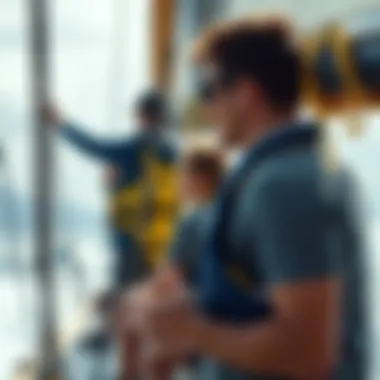
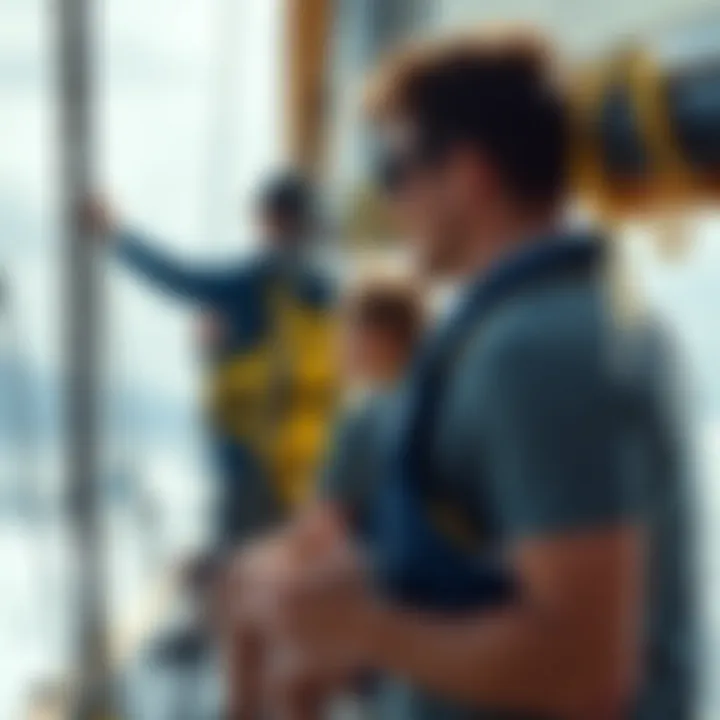
Through educational programs and immersive experiences, sailing camps continue to serve as key players in shaping the economic landscape of the Caribbean, encouraging communities to embrace and enhance their beautiful natural resources.
Environmental Sustainability Considerations
In the context of sailing camps, environmental sustainability is not just a buzzword—it's a vital principle that shapes how these camps operate and impact the local ecosystem. With breathtaking vistas and delicate marine environments, the Caribbean is both a paradise and a playground. The juxtaposition of natural beauty and human activity necessitates careful consideration of sustainability practices. Promoting environmental responsibility within sailing camps enhances not only the experience for participants but also protects the region's rich biodiversity.
Effective sustainability practices can drive long-lasting benefits: they help preserve delicate ecosystems, foster community goodwill, and attract environmentally conscious travelers. When sailing camps take the initiative to implement eco-friendly practices, they pave the way for a greener future.
Promoting Eco-Friendly Practices
The integration of eco-consciousness into sailing camps can manifest in various ways. For starters, the materials used in camp infrastructure often make a big difference. Using sustainably sourced building materials and minimizing plastic use can help reduce the carbon footprint of these camps. Furthermore, implementing waste reduction strategies such as recycling and composting can contribute immensely to maintaining the pristine conditions that travelers seek.
Participants could also be educated about local fisheries and habitats. By offering workshops on reef conservation or conducting beach clean-ups as part of the camp's activities, sailors learn the importance of protecting these environments for future generations.
- Utilize solar energy for lighting and equipment
- Organize community clean-up days
- Educate sailors on respecting wildlife
By embedding these practices into their operations, sailing camps can create a culture of respect for nature among participants. The message is clear: enjoying the beauty of the Caribbean doesn't mean exploiting it.
Impact of Climate Change on Sailing
As the climate continues to change, sailing camps are feeling the effects in significant ways. The increasing unpredictability of weather patterns impacts trip planning and the overall safety of the experience. For instance, greater frequency and intensity of storms pose a real threat to sailing activities. Moreover, rising sea levels threaten coastlines, affecting not only the physical locations of various camps but also the livelihoods of communities reliant on coastal tourism.
Adaptation becomes crucial in this scenario. Camps might need to re-evaluate their sailing routes, choosing areas that remain safe from extreme weather or selecting seasons that minimize risks. Additionally, implementing robust safety protocols will be essential for keeping participants secure and informed.
"The most effective strategy for adaptation is embracing change. Sailing camps must be forward-thinking to navigate the challenges posed by climate change."
Understanding climate change's impact on sailing is key to developing resilient operations that can withstand environmental challenges. For passionate adventurers who wish to experience the Caribbean's beauty, sustainable practices don't just ensure enjoyment—they secure the future of these magical waters.
Future Trends in Sailing Camps
The sailing camp landscape in the Caribbean is in a state of evolution, influenced by shifting societal norms, technological progress, and an increasing awareness of our environmental obligations. Understanding these trends is vital for anyone looking to engage with sailing camps, whether as a participant or industry professional. By examining these trends, stakeholders can ensure that sailing camps remain both relevant and beneficial for diverse groups.
Technological Advancements
Technology plays a pivotal role in shaping how sailing camps operate today. A prime example is the introduction of advanced sailing simulators. These tools allow beginners to grasp fundamental concepts before ever stepping aboard a vessel. The precise feedback and visual aids provided by simulators can significantly shorten the learning curve. Moreover, mobile applications have changed the game as well; they offer real-time weather updates, tide information, and navigational aids directly to sailors’ smartphones.
Benefits of Technological Integration:
- Enhanced Learning: By utilizing virtual reality or augmented reality, instructors can provide an immersive learning experience that deepens participants' understanding of sailing.
- Safety Improvements: Modern lifebuoys equipped with GPS tracking allow for quicker responses in case of emergencies.
- Data Analytics: Instructors can track performance metrics over time, personalizing lessons to suit individual needs effectively.
It's clear that these tools are not just novelties; they are becoming essential components of modern sailing education. For example, companies like Sailwave are already helping instructors develop race management skills through software that streamlines the process of scoring regattas and optimizing training.
Evolving Participant Expectations
As new generations of sailors emerge, so do their expectations. Today’s participants often prioritize more than just learning how to sail. They seek holistic experiences that incorporate environmental awareness, cultural immersion, and social connections. This shift in focus means that camps have to adapt to remain appealing.
Key Expectations of Modern Sailors:
- Eco-Conscious Offerings: More participants are interested in sustainable practices, such as using solar-powered boats or incorporating upcycling projects into the camp activities.
- Cultural Experiences: Participants appreciate the chance to engage with local communities and learn about regional traditions, such as calypso music or local gastronomy, while they sail.
- Community Engagement: Social interaction among campers has become increasingly important, leading to a call for more structured activities that foster camaraderie.
“In an age of connectivity, meeting fellow adventurers and discussing shared passions is as crucial as the sailing itself.”
In light of these trends, sailing camps that wish to thrive must continuously reassess their offerings. By doing so, they can create a richer and more inclusive environment that resonates with today’s evolving participants.
With both technological advancements and changing expectations turning the sails, future sailing camps in the Caribbean stand to benefit immensely from understanding and integrating these trends into their curriculums.
Closure
In wrapping up our exploration of sailing camps in the Caribbean, it becomes clear that these camps are not simply about learning to sail; they encapsulate a variety of experiences shaped by cultural, environmental, and economic factors. The importance of understanding the dynamics at play in these seafaring enclaves cannot be overstated, particularly for those looking to improve their sailing skills or delve into the unique lifestyle the Caribbean waters offer.
Certain critical elements stand out. Firstly, the educational opportunities available through these camps cater to a wide audience, ranging from beginners to seasoned sailors. The tailored programs ensure that no matter your skill level, there are avenues for growth and mastery. Secondly, these camps provide an environment ripe for cultural exchange, allowing participants to engage deeply with local traditions and practices that go hand in hand with sailing. This enriches the overall experience beyond mere skill acquisition.
Furthermore, it’s essential to acknowledge the broader impacts of sailing camps on local economies. They play a crucial role in fostering sustainable tourism, which not only benefits those directly involved in the camps but also impacts the communities surrounding them.
Summarizing Key Insights
To summarize the key insights from our discussion:
- Diverse Learning Opportunities: Sailing camps offer varied programs that are designed for all levels, ensuring that each participant can find a suitable entry point into the world of sailing.
- Cultural Engagement: The integration of local customs and social interactions within the camps fosters a rich learning environment, where participants benefit not just from technical skills but from cultural immersion as well.
- Economic Contribution: These camps significantly bolster local economies by attracting tourism and encouraging sustainable practices.
- Environmental Awareness: With a growing focus on sustainability, many camps are now incorporating eco-friendly practices into their training and operations.
As these insights underscore, the multifaceted nature of sailing camps goes well beyond what one might initially assume.
Encouragement for Continuous Learning
As we look toward the future of sailing in the Caribbean, it's vital to recognize the significance of lifelong learning within this domain. Sailing is not merely an activity; it is a journey that invites continuous exploration and improvement. Participants should always seek new knowledge and experiences, whether it involves taking advanced courses, attending workshops, or simply engaging with fellow enthusiasts.
The Caribbean's dynamic environment offers ever-changing conditions, and embracing a mindset of continuous learning helps sailors stay attuned to these shifts. Additionally, staying informed about technological advancements and environmental changes can enhance one's sailing experience.
In essence, whether you are a seasoned sailor or an eager novice, the new horizons of knowledge await. Dive deeper into the world of sailing, keep the sails unfurled, and continuously seek out opportunities to expand your skills and understanding.
As the saying goes, "A smooth sea never made a skilled sailor." Embrace the waves, challenges, and learning curves ahead.















